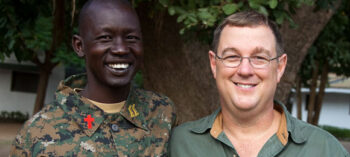 By Michael Ashcraft –
By Michael Ashcraft –
Distinctly, Wes Bentley heard God say to remain in a South Sudanese village after he contracted malaria and not fly out to seek help from a Western hospital.
As a result of his “foolhardy” obedience to the voice of God, two generals – one known as the Butcher of Sudan – came to know Christ.
“When I got sick, had I disobeyed the Lord and said I don’t want to be uncomfortable and gotten on that airplane and flown out, would these two men ever come to know Christ as their personal Savior?” Wes says on a Calvary Chapel Chino Hills video. “I doubt it.”
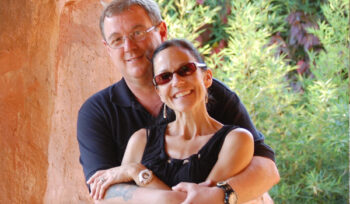 How did Wes Bentley go from being a high-flying salesman who dreamed of a Maserati to a high-risk missionary working in South Sudan for 26 years, supporting missionaries in 38 countries?
How did Wes Bentley go from being a high-flying salesman who dreamed of a Maserati to a high-risk missionary working in South Sudan for 26 years, supporting missionaries in 38 countries?
Originally, he was a U.S. Marines sharpshooter who gave up Olympics competition to kill people in Vietnam. Upon leaving the Marines, he wanted to become a soldier of fortune in Rhodesia, but God got ahold of his heart and redirected his steps.
Saved at Camp Pendleton, Wes was thrown in with the hippies of the Jesus Movement harnessed by Chuck Smith. For the clean-cut and disciplined Marine, it was strange to see hippies who bathed and he wondered at their sincere love for each other, a pure affection that manifested in ladies giving a guileless kiss on the cheek to the guys.
Instead of becoming a mercenary, Wes threw himself into business and was making a salary equivalent to $250,000 a year in today’s money, he says. All the other young guys had Porches, Rolls Royces and fancy cars, so Wes entertained the notion of getting himself a Maserati, which he could well afford.
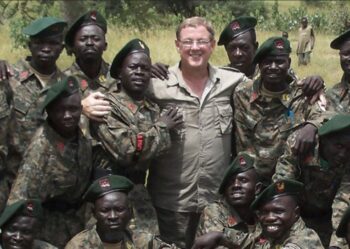 Fortunately, he consulted a sister in the Lord who had a knack for prophetic revelations. Without him explaining what exactly he was contemplating, he requested she pray for him. After prayer, she said, “The answer is no and I again I say no.”
Fortunately, he consulted a sister in the Lord who had a knack for prophetic revelations. Without him explaining what exactly he was contemplating, he requested she pray for him. After prayer, she said, “The answer is no and I again I say no.”
It probably wouldn’t have been a good idea to pull up in a Maserati at L.A.’s Skid row to hand out sandwiches to the homeless, a ministry he liked to participate in.
Through the years of ministry, Wes started to feel the missionary call for Russia, which after communism collapsed became open to the gospel for the first time in almost three-quarters of a century.
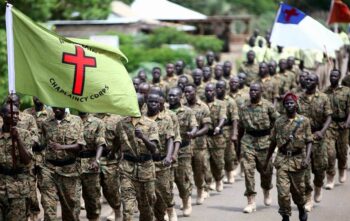 In Russia, Wes ministered mostly in the jails and packed theaters as people who were hungry for truth after being denied the Gospel by a series of repressive governments.
In Russia, Wes ministered mostly in the jails and packed theaters as people who were hungry for truth after being denied the Gospel by a series of repressive governments.
“Russia was my first love,” Wes says. “Russia was incredibly open to the gospel back then.”
It was in Russia that Wes fell in love with a Russian sister and nearly married her, had it not been for the unmistakable voice of God. At the time it seemed strange to tell the sister to not entertain romantic ideas toward him.
But years later when God called him to transfer his ministry to then war-torn South Sudan, it proved spot on. The sister confessed she wouldn’t have been willing to accompany him to the sweltering heat of the jungles of South Sudan. (There he married Vicky, who held 13 separate Bible weekly studies with South Sudanese women and served alongside Wes for 23 years,)
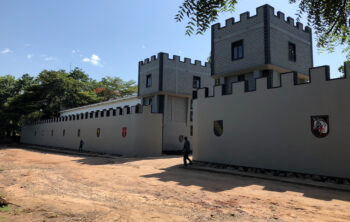 After five years in Russia, he moved to South Sudan, which gained its independence in 2011, making it the youngest internationally recognized nation in the world.
After five years in Russia, he moved to South Sudan, which gained its independence in 2011, making it the youngest internationally recognized nation in the world.
“Sudan is an extremely hot country. It’s not only hot, it’s very humid. You sleep out of exhaustion,” Wes says. “You don’t sleep because you’re comfortable. You literally sweat all night long.”
Heat is not the only thing to make you feel uncomfortable.
“When you’re out among the tribes, sometimes they bring you food that’s cooked and dead, and sometimes they bring you food that’s not dead,” Wes explains. One time, he and five visiting pastors from Calvary Chapels were brought live insects for dinner. The visiting pastors all felt called to “pray and fast” that night, Wes says.
Wes didn’t feel called to pray and fast. He dug in hungrily into the meal of flying ants.
“You pluck the wings off, and you put them in your mouth and they kind of walk around inside your mouth, and you bite down on them,” Wes says. “They’re kind of crunchy on the outside and chewy on the inside. They don’t taste anything like chicken.”
Today, West supports 1,000 chaplains in the South Sudanese army through his own ministry, Far Reaching Ministries.
The idea of training chaplains arose after Wes shared the gospel with a group of soldiers and hundreds of them came to Christ. He wanted to give them a “moral compass,” he says. “What the Arabs are doing to them, they’re doing right back to the Arabs. They’re doing all the atrocities back.
“We needed to make them understand that fighting and killing is a part of warfare,” he explains. “But murder, rape, pillaging and plundering is not.”
In his time in Sudan, Wes has contracted malaria about 35 different times, sending him to ICU on four separate occasions. It was in the first year training chaplains that Wes contracted malaria and decided to weather the storm.
“I could have gotten on a bush plane and flown out to a western hospital, but I very clearly hear the Lord say stay in the village,” he says. “I knew it would be a witness to the people.”
Wes went in and out of consciousness with exceedingly high temperatures. He credits his survival with nothing less than a miracle. During his convalescence, he received visits from prominent South Sudanese commanders Mamur and Paul Malong. Both are generals now.
Paul Malong was a 6’7” brutal warlord known as the “Butcher of Sudan,” who would line up captives and arbitrarily decide who would live or die.
Wes says his fever peaked at 111 degrees, which medical science says is lethal. “I knew that I was dying.”
But after the fever broke, Wes miraculously survived. Soon afterward, Malong visited Wes in his safari tent.
“You know, Wes, when I saw you, I really thought you were going to die,” the then-commander said. “I don’t understand you. This isn’t your country, yet you’re willing to die for it.”
Wes replied: “If I die, I will go home to be with the Lord. But if you die, you will perish for all of eternity.”
Not long after, Mamur visited him again. Mamur exhibited more interest in the gospel, so Wes hooked him up with cassette tapes of Christian teachings. “He was listening to them all the time,” Wes says. He also got him a VCR so he could watch “Countdown to Eternity,” which he saw 40 times, Wes says.
During their first graduation of chaplains, Wes and his associates fully expected to get bombed. In all, the chaplains got bombed 40 times during Wes’s ministry in South Sudan. But on their frist graduation day, heavy cloud cover blocked them from view of the bombers they heard flying overhead.
It seemed like another miracle.
Afterwards, Wes drove Mamur to his compound. As he was dropping him off, the Lord impressed on Wes’s heart: It’s time.
“Commander, i need to talk to you about the most important decision you’re ever going to make in your life,” he began. “Do you want to be forgiven of your sins? Do you want to know if you were to die tonight, you’ll go Heaven?”
“Yes,” Mamur replied.
In front of 70 of his officers, Mamur bowed his head and prayed the sinner’s prayer.
Dear Lord Jesus, I come before you confessing that I am a sinner in need of your forgiveness. I am truly sorry for my sins.
I believe that you, Jesus, died on the cross for my sins and that you rose from the dead, conquering sin and death. I place my trust in you alone for salvation. I ask for your forgiveness and invite you into my heart and life.
Please cleanse me, renew me, and guide me by your Holy Spirit. I surrender my will to yours, and I commit to following you and obeying your teachings. Thank you for your love, grace, and mercy.
In your precious name, Jesus, I pray. Amen.
Mamur became a new creature in Christ! “Wes, I fully understand what I have done,” Mamur said afterwards.” I have received the full born again experience. I will not turn back. I want you to baptize me.”
When Wes returned to his own compound, there was the other commander, Malong, waiting for him. Thirty minutes later, Paul Malong, the “murderous butcher,” according to the words of Wes, became a completely changed man.
“Now he’s a completely different man,” Wes says.
The salvation of these two prominent militant leaders was brought about by Wes’s willingness to be “uncomfortable,” enduring a short time of suffering for eternal rewards. Had he opted for the easy route, to hop on a bush plane and be taken to a Western hospital, it is hard to know when these two men would have found salvation.
If you want to know more about a personal relationship with God, go here
About the writer of this article: Michael Ashcraft teaches journalism in Lighthouse Christian Academy in Los Angeles. He was a missionary in Guatemala for 16 years.




[…] Wes didn’t feel called to pray and fast. He dug in… Read the rest: Wes Bentley South Sudan […]
This is WONDERFUL! Our God REIGNS!
SO happy those two men got saved!!
So thankful to dear, godly brother Wes!
A Bíblia condena o militarismo, será que estes capelães conhecem Apocalipse 19:17 a 21.
(Translation:The Bible condemns militarism, do these chaplains know Revelation 19:17 to 21?)
Comments are closed.